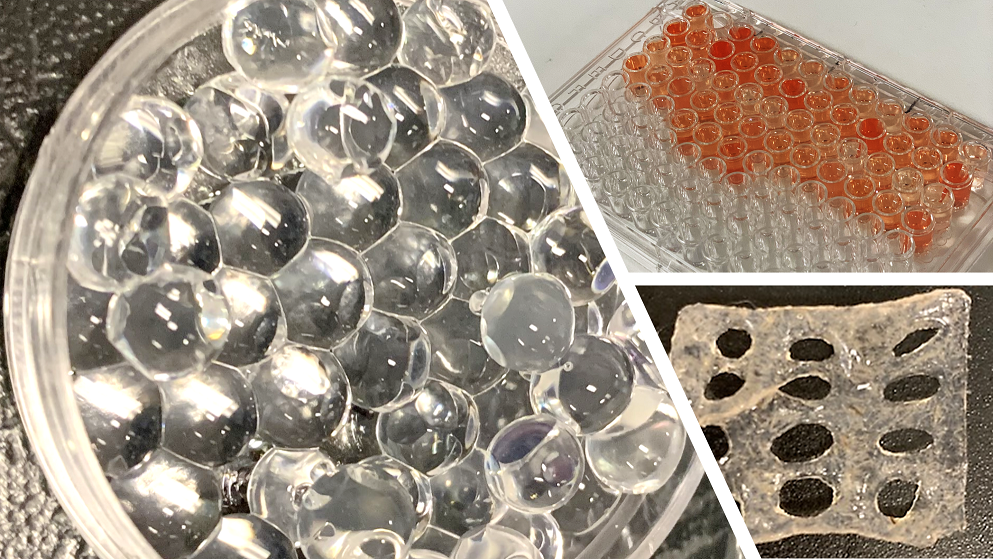
Project description: Structural modification of alginate to develop novel 3D-Bioprinting biomaterials
The proposed research is cutting-edge in materials science, particularly 3D-scaffold biomaterials and 3D-bioprinting for biological tissues.
SCHOLARSHIPS AND TOP-UP SCHOLARSHIPS
CMBD PhD Applicants:
CMBD rewards academic excellence, and encourages domestic and international applicants to apply for various
scholarships from Flinders University, the Australian government, their home countries and any other third party sources.
The standard Australian PhD scholarship is currently valued at $28,597 (tax-free) per year for a duration of three years.
CMBD will offer a ‘Top-Up scholarship’ of an additional $5,000 per year to a value of $33,597 (tax-free) per year for those PhD applicants who have secured other scholarships.
For PhD students who have demonstrated an outstanding academic performance in their first year, a Top-Up scholarship of $10,000 will be offered for years two and three of their PhD candidature to a value of $38,597 (tax-free) per year.
CMBD also offers a research project-based scholarship at the standard rate for PhD candidates.
Please contact us to ascertain if you meet the selection criteria.
Team Research Area and Description
The PhD candidate will undertake research in the area of Marine Biomaterials and Polymers to develop 3D-Bioprinting
platforms in both the CMBD and College of Science and Engineering, Flinders University.
The projects are inter-disciplinary and offer opportunities for national and international collaboration.
The aim of the research includes;
- the development of a comprehensive design and fabrication process flow diagram
- in-depth physio-chemical characterisation of biomaterials to address Critical Quality Attributes (CQA) of
products and Quality by Design (QbD) - innovative technologies from functional chemistry, biochemistry and biomedicine to develop artificial scaffolds for tissue and organ regeneration
The application of novel biomaterials will focus upon skin care and neuronal organoids for tissue regeneration using 3D-bioprinting technology.
Masters & Honours candidates will be involved in the analytical characteristation of biopolymers, chemical modification of biopolymers and preliminary testing of 3D-bioprinting.
The PhD project will include the design and development of biomaterial scaffolds for bioink, computational modelling for constructing scaffolds, formulation of bioink for 3D-bioprinting, in-vitro testing of bioink and feasibility assessment for 3D-bioprinting.
College of Medicine and Public Health, Flinders University
Level 4 Health Sciences Building, Registry Road, Bedford Park SA 5042, Australia
PROJECT DESCRIPTION – Structural modification of alginate to develop novel 3D-Bioprinting biomaterials
The proposed research is cutting-edge in renewable biomaterials science, particularly with regard to enhancing the mechanical stability and structural integrity of 3D-scaffold biomaterials.
It aims to generate scientific understanding in the development of tuneable properties in alginate-based biomaterial scaffolds suitable for tissue engineering and 3D- bioprinting for artificial tissue and organ replacements.
Alginate is a polysaccharide from brown seaweed and composed of β-D-mannuronic acid (M-block) and α-Lguluronic acid (G-block) which typically form a co-polymer.
The G blocks in alginate are the primarybinding sites that impart viscosity to the resulting alginate solution which interacts with Ca2+ ions to cross-link to form hydrogels.
Alginate-based biomaterials have been in development for a decade, but cell and tissue applications require modification of the physico-chemical properties of natural alginate to improve mechanical strength.
Mechanical stability is an important attribute that needs to be achieved for a biomaterial to be suitable for producing 3D-tissue regeneration scaffolds.
The project aims to create supramolecular structures to control the mechanical strength of the material and to achieve the structural stability to mimic native cellular matrices.
This project will include the application of in house patented technology; the Vortex Fluidic Device, to slice the structure of alginate to alter its physico-chemical properties.
High level of analytical techniques including; SEM, FTIR, NMR, HPLC,XRD, XPS, TGA, DSC, DLS will be used to characterise novel biomaterials and those suitable will be tested in 3D-bioprinters to test amenability for extrusion at industrial scale.
Applicants should have;
- a sound knowledge of microbiology, polymer chemistry, chemical engineering, biotechnology or material science
- demonstrated research experience in analytical characterisation – NMR, HPLC, FTIR, SEM, DMA
- well developed interpersonal skills and ability to work in a research environment
- demonstrated skills for a systematic review of the current literature
How to apply;
i. A one page cover letter (motivation and reasons for applicant to be considered for the position)
ii. A detailed CV – education, work experience, skills, dissertations, research interests, career objectives, names and contact details of two referees (including at least one academic), list of publications (if any).
iii. A transcript of applicants grades (including overall grade) if available
iv. Proof Of English language proficiency e.g, English language certificates for non-native speakers.
v. At least one letter of recommendation, preferably by the Master’s thesis supervisor
Applications and further enquiries should sent via email to:
Dr. Reinu Abraham, reinu.abraham@flinders.edu.au
Dr. Zhongfan Jia, zhongfan.jia@flinders.edu.au
Image: Algae based biopolymer materials Image credit: Reinu Abraham

